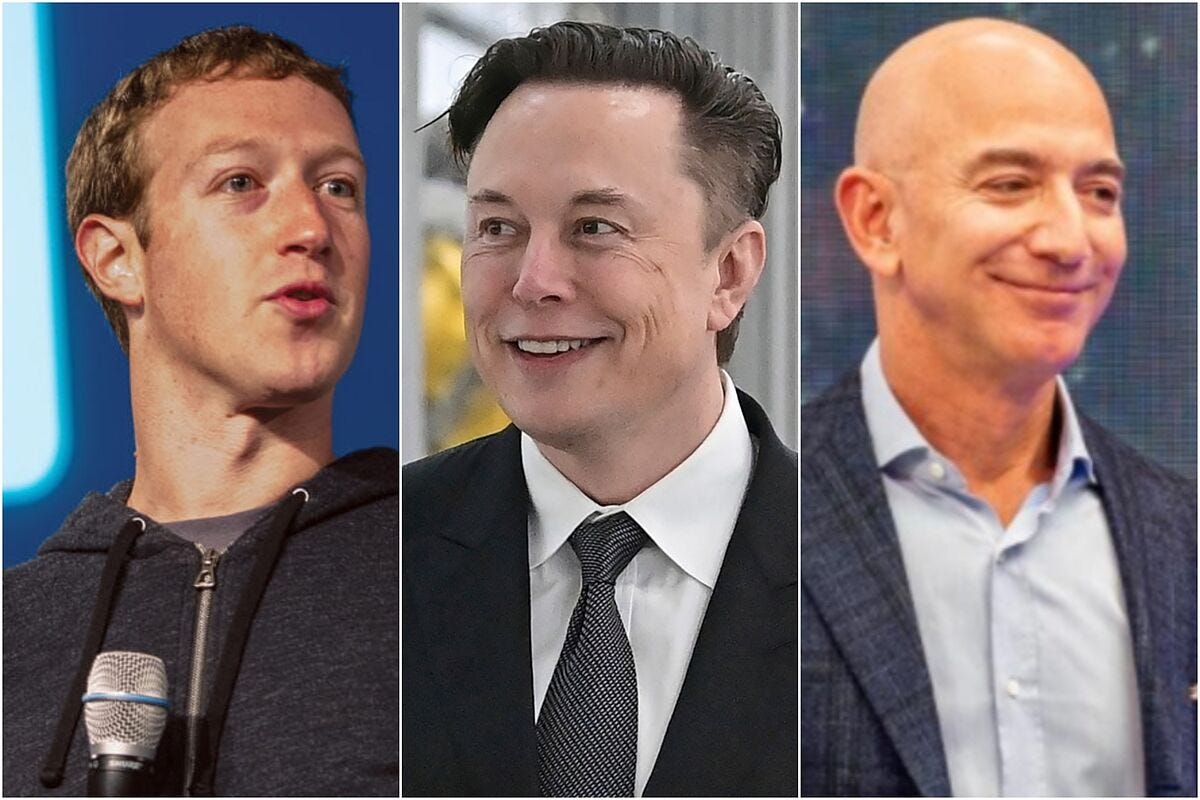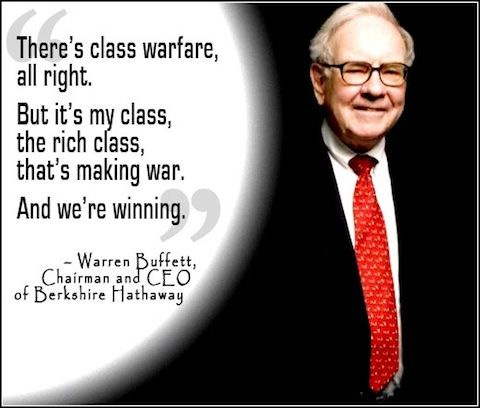From 'Two Americas' to Technocracy?
Technocrats will "solve" the issues guys like Bernie Sanders raise ... in their own way.
Last week, while in the waiting area for a doctor’s appointment, scrolling through a newsfeed, I happened upon an article that brought me up short. Especially as it came from someone I’d considered rather odious — though surpassed in his odiousness by the person who basically stole the Democrat Party nomination from him back in 2016.
Just watch and listen, and forget for a moment that it’s Bernie Sanders, who self-identifies as a “democratic socialist.” Forget, for the moment, what you’ve been taught, or told, about “capitalism” versus “socialism,” and other “isms” floating about. Forget, for the moment, about “left” versus “right.” We’re not talking abstract ideologies here. We’re talking about real human beings and their lives, families if they have them, and struggles.
It strikes me that because of what Peter Turchin calls the “wealth pump” of the past 40 years — what I’ve called welfare-statism in reverse, the redistribution of wealth upwards — that the system really is broken and that we really do have “two Americas.” (See Peter Turchin’s End Times: Elites, Counter-Elites, and the Path of Political Disintegration, 2023).
The “Two Americas.”
The one America — the upper echelon of the billionaire class, the point-zero-zero-one percent — has never had it better! These people have multiple yachts, plush mansions, private planes, private islands in places like Hawaii … and sizeable, well-stocked underground bunkers where they could flee if the world outside their wealth bubble went to pieces all at once.
The wealthiest four men in the world — Elon Musk, Larry Ellison, Mark Zuckerberg, and Jeff Bezos — are collectively worth more than $1.3 trillion! Musk alone is worth more than the bottom 52 percent of Americans! He’s said he’s “building the future.” But as I often ask, will it be a future any of us want to live in, or want our children to live in?
Bezos can spend $50 million on a wedding and buy his new wife a wedding ring that cost somewhere between $3 and $5 million (who’s counting?)! Zuckerberg spent $110 million to buy 11 homes in Palo Alto, Calif., creating his own private enclave.
The other America is living hand-to-mouth, paycheck to paycheck, if even that. For them, “our” New Gilded Age economy is collapsing. Many have zero savings, are deeply in debt, could not afford a $500 car emergency without falling further into a financial black hole.
They pray to not get sick, injured, or have a family member get seriously ill, because even if by some chance they have medical coverage they couldn’t afford the deductible. And any procedure recommended to them could be refused healthcare coverage as “unnecessary” by a corporate bureaucrat who isn’t a doctor.
These are the “immiserated,” Turchin calls them, whose wages have failed to keep up with the rising cost of living during the period of currency debasement that got underway not long after Nixon killed the gold standard and Friedmanite neoliberalism became the dominant form of capitalism in the West.
The job market has shifted, moreover, from steady, reliable, full-time work, to part-time “gigs,” as corporations have saved on labor costs through outsourcing, automation, and now AI. So while productivity has soared during the neoliberal era, only the top 1 percent has reaped long term benefits. The top 1 percent, after all, is now worth more than the bottom 93 percent.
Many in this 93 percent have to decide between child care and paying the electric bill. The lives of many working adults — with two and sometimes three part-time jobs — have begun to resemble those you’d find in a low-trust Third World country.
Generation Z (born from 1997 to 2012) is understandably bitter, with college degrees in good subjects but nevertheless living with Mom and Dad because they cannot afford the rent on a decent apartment (average cost: $1,500/mo. on up), much less a house.
They’re giving up on the so-called American Dream (home ownership, family, long-term financial stability), because they know that most of their number will never do as well as their parents.
They improperly blame us Boomers. Most of us did not do this. A few of us reaped windfalls in the ‘80s and ‘90s, as did a few Gen Xers. But many of us are also struggling.
All recent generations have slipped economically, amidst wage stagnation, unless they made a few clever money moves (typically with the help of insider mentors) or became reliable corporate underlings.
In other words, Bernie Sanders’s observations aren’t off target, even if you reject the ideology he operates out of.
Is it normal, after all, for the top four wealthiest men in the country to be worth more than the bottom 90 percent?
Peter Turchin argues compellingly that this is a recipe for social unrest and the sort of political polarization and instability we are seeing (whetted, of course, by social media corporations with a business model that enhances outrage). Especially given the widespread perception that the haves have cheated to get where they are, that they’re the beneficiaries of a rigged system.
Nick Hanauer, one of the handful of billionaires with open eyes, has warned that “the pitchforks will come out.”
A couple of years ago I penned an article undertaking a thought experiment. I worked out the math on what would be involved in terms of hourly pay, for someone to earn $1 billion in the marketplace. That is, making something others wanted and would pay for, or undertaking some service others desired. Serving their fellow men and women that is, as a means to serving their portfolios instead of the latter being an end in itself (the epitome of greed).
What I discovered: not a single honest job in the world, or honest business, would pay that kind of money!
But … passive income!
I know. Money making money. If even that, and not money obtained through lucrative insider deals with the Deep State. (Musk, Zuckerberg, Bezos, and others of the billionaire class have all benefited from such.)
Musk has become at least $180 billion richer since the election he helped bankroll. (I say at least because I couldn’t find the exact date of that stat.)
Is all this just “class warfare,” the canard of neoliberals?
Warren Buffett: “There’s class warfare, all right, but it’s my class, the rich class, that’s making war, and we’re winning.”
Straight from the horse’s mouth, or no?
The Big Picture.
Let’s take a Big Picture perspective.
A healthy and thriving society, a society likely to remain stable and perhaps advance, needs the following:
- Affordable energy
- Affordable housing
- Stable families
- Affordable nutritious food
- Affordable healthcare
- Education that educates and doesn’t merely indoctrinate (including for trades)
And then what is arguably the most important of the lot:
- Religiosity: a sense of the Transcendent that defines a people’s place in the universe, provides moral leadership standing above politics and markets, and supplies long-term hope.
It should alarm us all, whichever side of the aisle we think we are on, that present-day America doesn’t have any of these.
Not one. Not on any large scale.
There are now over 800,000 homeless people in the U.S., spread across every major city and metropolitan area. Some, of course, are on drugs or are mentally ill and have been neglected by the system because they don’t have money. Others, though, haven’t merely made “bad choices” in life. They may have jobs. They just can’t afford rent or a mortgage, so they live in their cars or “couch surf.”
Stable families have become a thing of the past as marriages break up and young adults don’t get married (another reason being that trust between the sexes has never been lower).
We are having roughly 1.6 children for every two adults. Obviously this isn’t a sustainable replacement rate.
Obviously, too, families cannot properly nurture children in a stable environment if both parents (assuming there are two parents!) each have to work at multiple “gigs” at all hours of the day and night to survive.
Healthcare: we need to stop the canard about “socialized medicine.” In Chile, where I’ve lived for over a decade now, I had a heart procedure done last year for arrhythmia that would have cost over $20,000 in the U.S., not counting a deductible, lead-up appointments, hospital room, follow-up, etc. Know what it cost me here? Around $30 in U.S. dollars, the price of the initial consultation (of which the state-run insurance company paid around a third).
That was an eye-opener!
I’ve written previously about primary prevention: everything you can and should do to avoid getting sick. (See also this, a more recent statement.)
When I began beating this drum years ago, one Libertarian told me, “The problem with primary prevention is, it isn’t profitable.”
No, it probably isn’t. A healthy population, healthy because its people are practicing primary prevention, won’t enable pharmaceutical and healthcare corporations to get richer.
He thought that was a drawback of primary prevention. After giving the matter some thought of my own, I realized that it was a problem with profit-based healthcare which prioritizes money over health.
The result is a sick care system, not a healthcare system.
Lack of adequate healthcare is going to be ubiquitous for the majority in a dual-America (one class of billionaire overlords; versus the rest).
It is easy to observe that at the core of the large-scale shift from the treatment of acute conditions to the management of chronic conditions was the lure of profit-über-Alles.
So what’s the solution?
Frankly, Bernie Sanders’s solution is a weak call for “changes required to create a government and an economy that work for all, and not just the few”: weak because it includes no specifics.
This, I argue, is the culmination of Western secularism, which ultimately liberates the wealthy and powerful to do as they please because they can. Note: not simply do the rich get richer, often simply because they are skilled at navigating and negotiating a money political economy, but they attain a level of power that kings and emperors of earlier eras could not have imagined.
Where we’re headed: Technocracy. “Scientific” dictatorship. Or, what the late political philosopher Sheldon Wolin called inverted totalitarianism: totalitarianism is structural, encircling individuals, built into the system instead of resulting from the will of one autocrat.
These are all different names for Technocracy. The richest men in the country enumerated above are all arch-Technocrats. (For more on Technocracy and the near future, go here.)
Given that materialism (even if partly masked by the kind of “New Age” pseudo-spiritualism that has long circulated in the tech world, and for a while before) unleashes unaccountable power — it simply leaves those with money and power no reason for not enriching themselves further and ruling over the rest of humanity as they see fit — we’re on our way to a system based on total surveillance, total management, total controls.
Nominally “Communist” China, since Mao an officially atheistic society, is already there!
What might they do on our side of the Pacific? They’ve already started by digitizing everything, incorporating all resource acquisition and use into the Internet of Things (you’ll know this has happened when your refrigerator and microwave oven start “communicating” with you, including sending you unsolicited advertisements on a screen).
Then give everyone a digital ID (in the works). Then introduce Universal Basic Income to be paid out in Stablecoin (Central Bank Digital Currency that isn’t called that; also in the works).
Technocracy seeks total control over resources, human and natural. It seeks to digitize, monitor, quantify, and control everything in human life. The further it progresses, its systems will be harder and harder to opt out of. How much can you do today, after all, without a smartphone which follows you everywhere and automatically welds you to the Technocratic control grid.
Technocracy is also the culmination of the globalist mindset: the lure of world government in the service of global corporate leviathans. This mindset dates at least to the 1700s but was stymied by the lack of infrastructure to pursue such goals outside of banking networks able to control national economies.
That infrastructure, as I’ve emphasized, exists today — and then some!
Perhaps I shouldn’t be too hard on ol’ Bernie for not offering specifics on how to address the problem of “two Americas” in one video. Because it’s possibly the hardest problem we face, especially as so few — even among those who understand Technocracy and its origins — really go to the metaphysical and spiritual basics. Most just assume that political quick-fixes will work.
Question the materialist worldview, which gained ground spectacularly in the 1800s, especially after the Darwinian revolution in biology; and especially after the philosophical ideology of positivism, furthered by Auguste Comte and his followers, relegated all language about God, sin, the need for redemption, and so on, to the realm of the cognitively meaningless. This made materialism almost impossible to question by the developing intellectual mainstream, which soon became the cultural and political-economic mainstream which simply forgot about such topics because they didn’t make money.
If we’re going to promote a Christian worldview, though, we have to go Back to Basics, because much of the Evangelical movement has its own set of problems, especially its inclinations toward Zionism and embrace of Darby/Scofield heresies.
That’s a different article, however. So I will stop here, having laid out the problem of where we are, where we are heading, and what we have to question — large numbers of us, not merely a handful of isolated writers on Substack — if we really want a future we’ll want those who come after us to live in. This, again, is not about “left” versus “right,” or any specific ideology. It is about working for a world in which all human beings have intrinsic value because they were created in God’s image (Gen. 1:27).
_________________________
Steven Yates is a (recovering) ex-academic with a PhD in Philosophy. He taught for more than 15 years total at several colleges and universities in the Southeastern U.S. He has authored three books, more than 20 articles, numerous book reviews, and review essays in academic journals and anthologies. Refused tenure and unable to obtain full-time academic employment (and with an increasing number of very fundamental philosophical essays refused publication in journals), he turned to alternative platforms and heretical notions, including about academia itself.
In 2012, he moved to Chile. He married a Chilean national in 2014. Among his discoveries in South America: many of the problems in the U.S. are problems everywhere, because human nature is the same everywhere.
He has a Patreon.com page. Donate here and become a Patron if you benefit from his work and believe it merits being sustained financially.
Steven Yates’s book Four Cardinal Errors: Reasons for the Decline of the American Republic (2011) can be ordered here.
His philosophical work What Should Philosophy Do? A Theory (2021) can be obtained here or here.
His cosmic horror novel The Shadow Over Sarnath (2023) (written for the sheer fun of it) can be gotten here.
His most recent short book So You Want to Get a PhD in Philosophy? can be obtained here.
Should you purchase any (or all) books from Amazon, please consider leaving a five-star review (if you think they merit such). Readers notice, and so does the Amazon algorithm.







